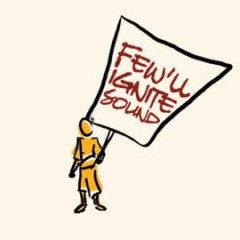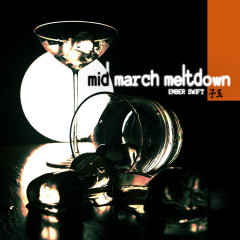Bitterness Valves
One of the first people I shared the news of my engagement with (after my family, that is) was my ex-partner. I wanted her to know before the news found her along the grapevine. Grapevines can strangle trust. Besides, we had been best friends for over twelve years (our relationship plus our earlier friendship) and I wanted such an important person in my life to know my important news.
It had only been a year and a half (not even) since our break-up and I knew she was still very resentful and bitter, but I also knew that it was her choice to be those things. I had just as much right to them and reason for them as she did. Our breakup was hard—on both of us.
But, I was pushing myself (and her, I admit) for peace at every juncture. Reaching out and sharing this news with her was another attempt at letting her know that she was important to me. I wanted our friendship. I wanted it to be intact.
And, I admit that I wanted her blessing.
In retrospect, it didn’t really matter how she found out, I imagine, or whether she would give me her blessing or not. She was writing her own story about our break-up and I had nothing to do with its composition.
After that conversation, however, (during which she was incredulous but then congratulated me and wished us well,) she didn’t speak directly to me for another year and eight months.
Not that I was counting.
After almost a year and a half of negotiations through mediation, in early spring 2009 just shortly after Guo Jian and I got engaged, she and I finally disentangled the many years of financial merging that had happened between us.
When money suddenly comes between two people who have spent over a decade at financial peace with each other, it gets ugly. I truly believe money is the grease on that valve of bitterness. Once it opens, it flows freely. And, for what? What’s it worth?
Nothing. Truly nothing.
And the stories that get told about break-ups are sadly truncated, incomplete, not to mention unfair. They make good stories that way, though. More compelling. More pathos.
I was cast in the role of the leaver. She played the role of the one who was left behind. In being left behind, she was the victim of the leaver’s decision to leave. In the leaving, I was the perpetrator of the crime. That was how it went down in most people’s eyes. I heard it confirmed time and time again.
And yes, in one main way, I was the leaver. I moved out of the house. I went back to China. I left.
Did I leave her? No more than she left me. Hearts depart. That’s what happens.
And leaving that relationship was truly the hardest and bravest thing I have ever done. Having hurt each other for too many years, having spent almost three of those final years trying to negotiate my bitterness and anger and broken heart about her other lover while still stubbornly remaining in the relationship, and then having found a place that helped me heal from all that (China) were all chapters of the same story. Then her unwillingness to allow me that healing or another love of my own (Guo Jian) was also part of that story. Without these chapters, the story is incomplete.
The worst was that I began to hear that I had “left her to marry a man in China.” The injustice and inherent judgment in that summary made me want to spit.
But there was nothing I could do about those limited views except just wait for it all to no longer be important to people anymore, for it to no longer be relevant. Because, really, no one was going to truly understand it except the both of us. And even between the two experts on the inside—me and her—our two stories were never going to align. They had started to grow apart the minute we had split apart. They were both accurate. They were both true. They were both incomplete.
And where was Guo Jian in all of this?
Throughout my year and half of recovery from this break-up, throughout all the mediation and negotiations, throughout all the heartache of it, Guo Jian was in my life. You’d think that his presence would be like a balm to a broken heart, but it didn’t work like that. He and I occupied a particular frequency together that didn’t cross wires with the frequency of grief and recovery that I had to go through with my ex-partner. They were parallel signals on a radio dial that simply didn’t cross one another. I also couldn’t shut one off to experience the airwaves of another. They were simultaneous. Simultaneously separate.
Early on, he said to me that even though he knew I was struggling, he couldn’t be there for me. He said, “If you need a hug, I’ll give you one. But, I can’t help you with this. It’s yours. It has nothing to do with me.”
One day I had been crying at the computer screen and he came up and hugged me from behind. In typical Chinese style, he wanted me to stop crying, “行了,行了,别哭了!xing le, xing le, bie ku le! (alright, alright, don’t cry!)” but he also didn’t want to know why I was crying. It was irrelevant he said, sweeping his hand at my suggestion that I share with him the reason for my tears. The reason wasn’t important. “The more you tell me, the more you’ll cry,” he said. Then he led me away from the computer screen into another room and changed the subject.
At first, I resented what I saw as his lack of support, but then I came to thank him for it. It kept the joy of our love untarnished by the grief of my break-up. The two could co-exist without poisoning each other. The joy couldn’t assuage the pain, but they weren’t meant to. Each was happening equally in my heart and they each got their space.
And, now that I look back on it, the way he chose to deal with it was actually the most supportive way possible. It really did have nothing to do with him. He stayed out of it and that was the right choice. It was brilliant, really.
To this day, I’m not sure if it was conscious brilliance or just his inability to ever relate to the problems that inadvertently placed him in that role. He had never had a long-term relationship (beyond a year and a half) and he had only lived with a partner one time before, when he was 19 years old. As two kids, even he acknowledged that they had no idea how to make it work living together.
So, did he back off out of respect for its separateness, or did he back off because he had no wisdom to impart anyway?
In the end, the answer to that doesn’t matter. The fact that he did back off is key. It was perfect.
When my ex and I finally sat down across a table from one another again in late October of 2010, it had been just two months shy of three years since we had officially split up. Our reconnection itself was nothing special and just consisted of simple chatter and updates about our lives, but the symbolism of her finally being willing to share physical space with me again, even in a public café, was not lost on me.
It finally triggered the closure of the bitterness valve. We had both been through so much since we had been in each other’s lives and there was no doubt we were both different and had moved on; we were both scarred but had survived.
But more importantly, I felt in her a lifting of an emotional embargo that I had wished many times had never been put in place. I could almost see it straining, creaking, and hauling itself up and off her shoulders throughout our conversation.
Maybe that was just the sound of the valve closing?
I left that meeting still wishing her only peace. I will always love her. She will always have a place in my heart and be welcome in my life. I told her so. She heard me.
Stories are ours to write just as I am writing this one. One day, I hope to read hers. Together, they form the full story. Separately, they are only that: separate, two sides, incomplete.








